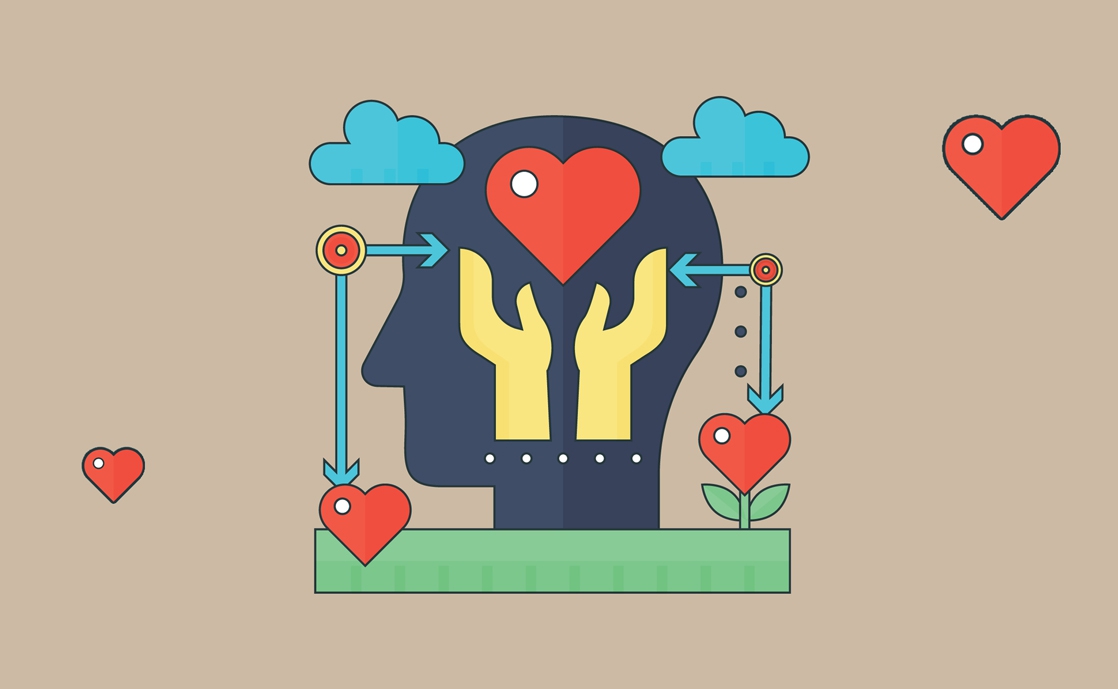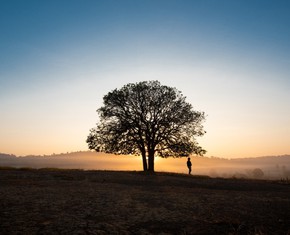The views expressed in our content reflect individual perspectives and do not represent the authoritative views of the Baha'i Faith.
Have you ever fallen in love—and then, a while later, fallen right out again? If so, you may have started to question your initial feelings, or even the idea of love itself.
Our culture still accepts and endorses the concept of love as an event, an accident, a thing quite beyond our willful control. Abdu’l-Baha—the son and successor of Baha’u’llah, the founder of the Baha’i Faith—said that none of the first three paradigms we described can be defined as love, at least not as far as they go, which is about six to ten months, according to my newly calibrated Hollywood adjustable sliding scale of relationship longevity.
RELATED: The Origins of the Myth of Romantic Love
In a talk on love he gave in Paris, Abdu’l-Baha described this kind of temporary infatuation we often think of as love:
But the love which sometimes exists between friends is not (true) love, because it is subject to transmutation; this is merely fascination. As the breeze blows, the slender trees yield. If the wind is in the East the tree leans to the West, and if the wind turns to the West the tree leans to the East. This kind of love is originated by the accidental conditions of life. This is not love, it is merely acquaintanceship; it is subject to change.
Today you will see two souls apparently in close friendship; tomorrow all this may be changed. Yesterday they were ready to die for one another, today they shun one another’s society! This is not love; it is the yielding of the hearts to the accidents of life. When that which has caused this ‘love’ to exist passes, the love passes also; this is not in reality love.
So what, then, is the distinction between the feelings we commonly accept as love and the authentic love alluded to in The Hidden Words of Baha’u’llah, in which he describes what God feels for us and what He desires that we feel for Him in return?
O Son of Love! Thou art but one step away from the glorious heights above and from the celestial tree of love. Take thou one pace and with the next advance into the immortal realm and enter the pavilion of eternity.
Or, stated in terms of Baha’u’llah’s The Seven Valleys, if this powerful attraction which follows on the heels of intensive and dedicated search is a valid part of an organic process, what can and should follow this initial stage that we seem so ready to mistake for the entire experience?
Socrates portrays this process in The Symposium in terms of the metaphor of a ladder of love. For while the concept of “Platonic love” has come to connote a non-physical relationship, the process often begins with physical attraction or infatuation and proceeds by degrees through graduated stages—rungs on the symbolic ladder of the refinement or ascent of love. Thus, Platonic love portrays this blinding magnetic attraction not as an invalid part of love; rather he describes this as one of the first stages in a sequence of what can become an ever more refined relationship. His point is that this initial stage should not be accepted as the end stage or as the objective of the love relationship.
This graduated sequence, which became the basis for most mystical treatises in both Christianity and Islam, is similar to the process portrayed by Baha’u’llah in The Seven Valleys. Here, too, love as ardent attraction is not disdained, nor perceived as inappropriate. This intense ardor and longing and passion may be the initial stage of authentic love, but only if it leads the lover to other succeeding stages of progress and development. Otherwise, the intensity and blind attraction has no meaning in and of itself and may ultimately become destructive if no progression results.
RELATED: A Modern Affliction: The Neurotic Concept of Love
Thus, the succeeding stage of this process consists of extricating oneself from this blind infatuation in order to examine the nature or character of that to which we are attracted.

Since it is not uncommon for us to be attracted to that which is unhealthy for us, even as one who is a condition of poor health may find appealing foods that are unhealthy, this stage or rung or valley requires that we withhold acceding to passion until we determine if what attracts us is worthy of proceeding further in this process.
But understanding whether what attracts us is healthy for us or not requires that we understand how we are constructed—that is, what is conducive to our health and what is detrimental. For example, the Baha’i writings affirm that God fashioned us with an inherent love of reality because reality as a whole, as well as all of its constituent parts embody or manifest some divine attribute.
Stated another way, we know we love stuff, and we can’t seem to get enough of stuff because the first emanation from God to humankind is our desire to find out about stuff.
In a talk he gave in Washington, DC in 1912, Abdu’l-Baha explains this desire as follows:
Science is the first emanation from God toward man. All created beings embody the potentiality of material perfection, but the power of intellectual investigation and scientific acquisition is a higher virtue specialized to man alone. Other beings and organisms are deprived of this potentiality and attainment. God has created or deposited this love of reality in man.
But why are we created with this love of reality, whether it be a tree, a flower, a pet, or another person? Baha’u’llah indicated that the huri—the deep mystery, behind this inherent or “God-given” affection—involves everything in creation manifesting some aspect of the nature of the same Creator, from whom we emanated as a breath of spirit:
… all things, in their inmost reality, testify to the revelation of the names and attributes of God within them. Each according to its capacity, indicateth, and is expressive of, the knowledge of God. So potent and universal is this revelation, that it hath encompassed all things visible and invisible.
So that’s why we love stuff—because in some way, everything, including ourselves, reminds us of our sacred origin and that to which we long to return, even though we may spend our lives oblivious to the source of that insatiable desire.
This series of essays is adapted from John Hatcher’s address to the 2005 Association for Baha’i Studies Conference titled The Huri of Love, which comprised the 23rd Hasan M. Balyuzi Memorial Lecture.
















Comments
Sign in or create an account
Continue with Googleor